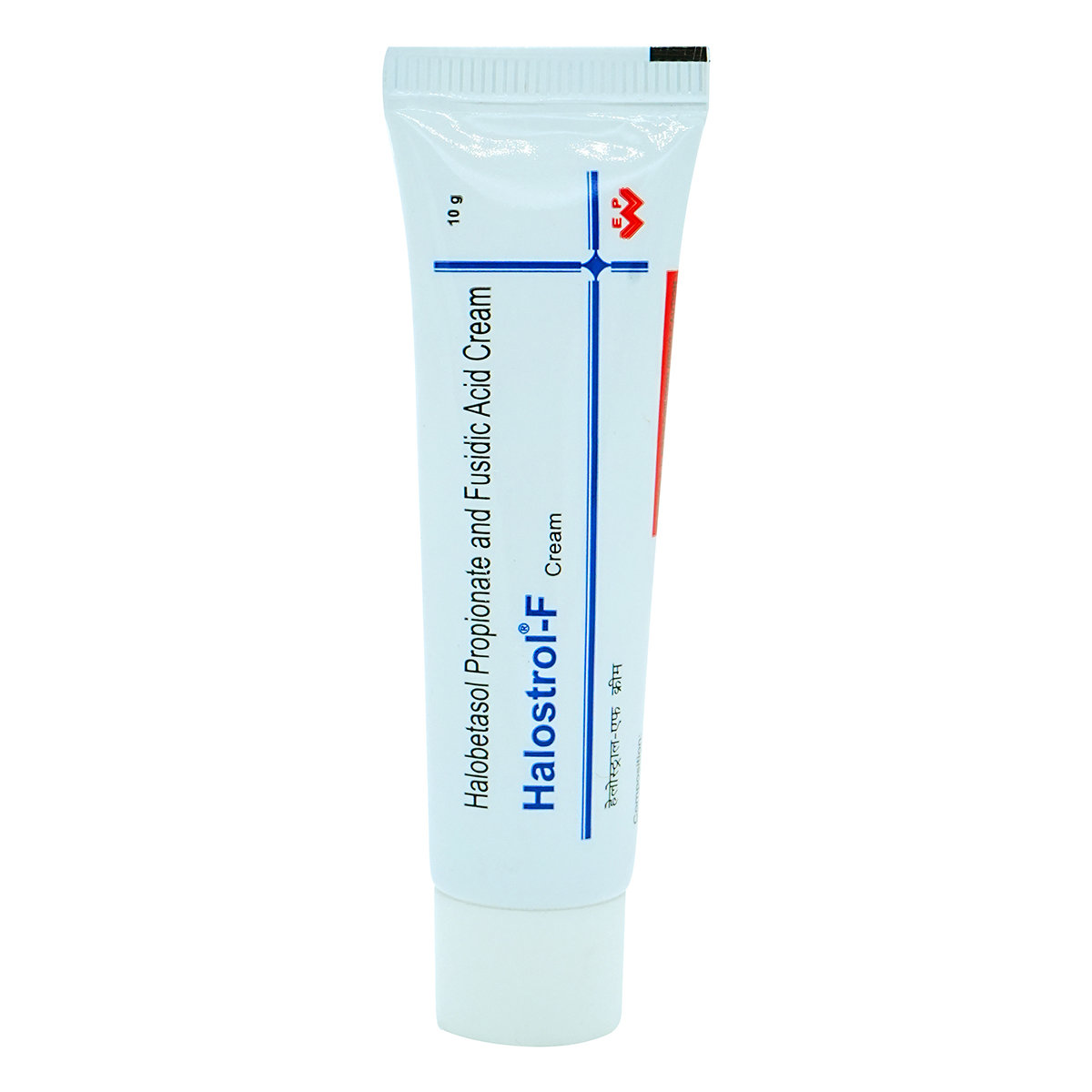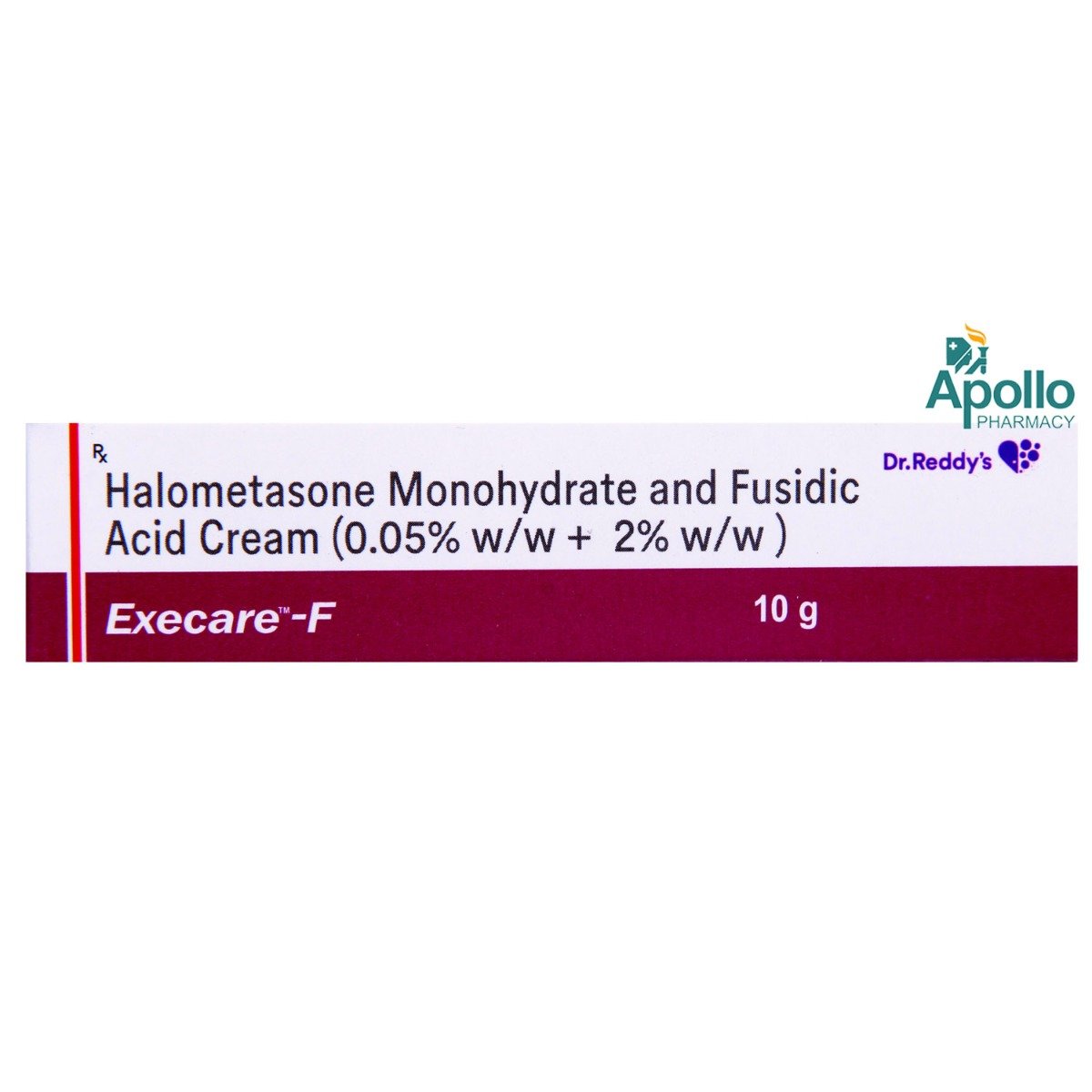Halometasone+fusidic Acid
About Halometasone+fusidic Acid
Halometasone+fusidic Acid is a combination medicine used to treat bacterial skin infections such as impetigo (swollen skin patches), folliculitis (inflammation of hair follicles), paronychia (infection around fingernails), sycosis barbae (infection of bearded skin), and erythrasma (infection of the skin). Bacterial skin infection occurs when bacteria enter the body through broken skin. Halometasone+fusidic Acid does not treat viral or fungal skin infections.
Halometasone+fusidic Acid is a combination of two medicines, namely: Fusidic acid (antibiotic) and Halometasone (steroid). Fusidic acid works by preventing the synthesis of essential proteins required for the survival of the bacteria. Halometasone works by inhibiting the release of chemical messengers that cause inflammation and redness. Together, Halometasone+fusidic Acid helps in treating skin infections.
You are advised to use Halometasone+fusidic Acid for as long as your doctor has prescribed it for you, depending on your medical condition. In some cases, you may experience certain common side effects such as irritation, itching, burning sensation, and redness at the site of application. Most of these side effects do not require medical attention and will resolve gradually over time. However, you are advised to talk to your doctor if you experience these side effects persistently.
Do not use Halometasone+fusidic Acid if you had a skin reaction or irritation to any steroid medicine. Consult your doctor before using Halometasone+fusidic Acid if you are pregnant or breastfeeding. Do not use Halometasone+fusidic Acid in more than prescribed doses or on a large area of skin for a longer duration, as it may cause adverse effects. Do not apply Halometasone+fusidic Acid on children’s skin unless prescribed by the doctor. Keep your doctor informed about your health condition and the medicines you are taking to rule out any side effects.
Uses of Halometasone+fusidic Acid
Medicinal Benefits
Halometasone+fusidic Acid is a combination of two medicines, namely: Fusidic acid and Halometasone. Halometasone+fusidic Acid is used to treat bacterial skin infections such as impetigo (swollen skin patches), folliculitis (inflammation of hair follicles), paronychia (infection around fingernails), sycosis barbae (infection of bearded skin), and erythrasma (infection of the skin). Fusidic acid is an antibiotic that works by preventing the synthesis of essential proteins required for the survival of the bacteria. Halometasone is a steroid that works by inhibiting the release of chemical messengers that cause inflammation and redness. Together, Halometasone+fusidic Acid helps in treating infections.
Directions for Use
Storage
Side Effects of Halometasone+fusidic Acid
- Irritation
- Burning sensation
- Itching
- Redness at the site of application
Drug Warnings
Do not use Halometasone+fusidic Acid if you are allergic to any of the components; if you have rosacea or leg ulcers. Consult your doctor before using Halometasone+fusidic Acid if you are pregnant or breastfeeding. Do not use Halometasone+fusidic Acid in more than prescribed doses or on a large area of skin for a longer duration as it may cause adverse effects. Do not wrap or cover the treated area with a bandage unless advised by your doctor. Do not apply Halometasone+fusidic Acid on children’s skin unless prescribed by the doctor. Consult your doctor if your condition does not improve despite using Halometasone+fusidic Acid for 1-2weeks.
Drug Interactions
Drug-Drug Interactions: No interactions found/established.
Drug-Food Interactions: No interactions found/established.
Drug-Disease Interactions: No interactions found/established.
Drug-Drug Interactions Checker List:
Safety Advice

Alcohol
cautionIt is not known whether Halometasone+fusidic Acid interacts with alcohol. Please consult your doctor.

Pregnancy
cautionPlease consult your doctor if you have any concerns regarding this; your doctor will prescribe only if the benefits outweigh the risks.

Breast Feeding
cautionPlease consult your doctor if you have any concerns regarding this; your doctor will decide whether Halometasone+fusidic Acid can be used by breastfeeding mothers or not. Do not apply Halometasone+fusidic Acid on the chest if you are breastfeeding.

Driving
safe if prescribedHalometasone+fusidic Acid is unlikely to affect your ability to drive.

Liver
cautionPlease consult your doctor if you have any concerns regarding the usage of Halometasone+fusidic Acid in patients with liver impairment.

Kidney
cautionPlease consult your doctor if you have any concerns regarding the usage of Halometasone+fusidic Acid in patients with kidney impairment.

Children
cautionHalometasone+fusidic Acid should be used in children only if prescribed by a doctor.
Habit Forming
Diet & Lifestyle Advise
- Eat foods rich in quercetin (a flavonoid) such as apples, cherry, broccoli, spinach and blueberries.
- Consuming food rich in probiotics helps in developing the immune system against allergies.
- Limit intake of food that might trigger allergies, such as dairy products, soy, eggs, and nuts.
- Avoid consumption of foods with excess sugar as it may flare up inflammation.
- Include fruits, vegetables, whole grains, healthy fats and fish in your diet.
- Reducing stress and maintaining a good sleep cycle would be helpful.
- Avoid getting in contact with harsh soaps, detergents and rough fabrics.
Special Advise
- Clean and dry the affected area before using Halometasone+fusidic Acid.
- Do not use Halometasone+fusidic Acid on dressing, band-aids and make-up unless told by the doctor.
- If Halometasone+fusidic Acid comes in contact with eyes, nose or mouth, rinse with water immediately.
- Wash your hands before and after using Halometasone+fusidic Acid; however, do not wash your hands if you are applying Halometasone+fusidic Acid on your hands.
Patients Concern
Disease/Condition Glossary
Bacterial skin infection: It occurs when a bacteria enters the body through broken skin. Bacterial infection could be of various types-Impetigo appears as red sores on the face, folliculitis is a skin infection that starts in an oil gland or hair follicle, paronychia is the infection around the finger/toenails, sycosis barbae is the infection of the bearded skin, erythrasma is a bacterial infection that affects the skin. Bacterial skin infections are generally mild and can be treated using topical antibiotics. Few infections need treatment using an oral antibiotic. Symptoms of a skin infection include rashes, blisters, cracked/dry skin, itching, redness, swelling, stinging or burning sensation.
FAQs
Halometasone+fusidic Acid contains Fusidic acid and Halometasone. Fusidic acid works by preventing the synthesis of essential proteins required for the survival of the bacteria. Halometasone works by inhibiting the release of chemical messengers that cause inflammation and redness. Together, Halometasone+fusidic Acid helps in treating skin infections.
Halometasone+fusidic Acid contains a steroid; therefore, it should not be used for longer durations unless prescribed by a doctor. If your condition does not improve despite using Halometasone+fusidic Acid for 1-2 weeks, consult your doctor, he/she may prescribe you an alternate medicine.
Avoid concomitant use of Halometasone+fusidic Acid with other topical products such as cosmetics, sunscreens, lotions, moisturisers, insect repellent creams, and other gels.
Do not cover the treated skin with dressings after applying Halometasone+fusidic Acid unless told by the doctor. Covering the skin can increase the amount of medicine absorbed through the skin leading to harmful effects.
Continue using Halometasone+fusidic Acid for as long as your doctor has prescribed it. Do not be reluctant to speak with your doctor if you experience any difficulty while using Halometasone+fusidic Acid.
Halometasone+fusidic Acid can be used on the face if advised by the doctor. However, you are advised to be cautious while doing so. Avoid applying Halometasone+fusidic Acid near the eye as it can cause a prickling sensation. If Halometasone+fusidic Acid comes in contact with eyes, nose or mouth, rinse with water immediately.



